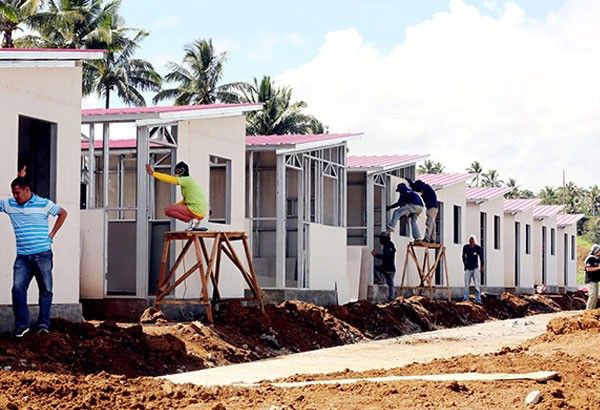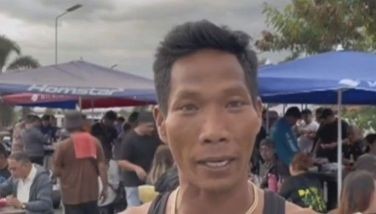Bangsamoro officials: Address 'open wounds' to curb terrorism

MANILA, Philippines — The government must address "open wounds" like the delayed rehabilitation of Marawi City to ease resentment at the government and curb recruitment by terrorist groups, leaders from the Bangsamoro Autonomous Region in Muslim Mindanao said.
Speaking at an online forum on the anti-terrorism bill organized by the Cotabato City-based Institute for Autonomy and Governance, they said that they are not opposed to addressing the threat of terrorism but stressed that it is more than a law enforcement issue.
Rep. Mujiv Hataman (Basilan), former regional governor of the Autonomous Region in Muslim Mindanao, said that lingering resentment over past atrocities in Mindanao led to the rise of groups like the Moro National Liberation Front and the Moro Islamic Liberation Front.
He mentioned the Jabidah Massacre in 1968, the burning of Jolo and the Palimbang Massacre in 1974 as among the incidents that led many to take up arms against the government.
Marawi rehabilitation, compensation
"Do we really think that if Marawi is not rebuilt, some day, that will not be a new narrative that terrorists or whatever organization will say 'Oh, you burned down Marawi. You destroyed it and until now the people there are suffering'?" he said in Filipino.
In a release earlier this month, the Department of Human Settlements and Urban Development said that rehabilitation of the city, the capital of Lanao del Sur and the site of months of bloody fighting against the ISIS-linked Maute Group, is on track and that construction of infrasructure projects in the Most Affected Area will be done by December 2021.
A Rappler report in May, on the third year since the siege, noted that "25,355 families or 126,775 individuals still live as evacuees in the outskirts of the city and in different parts of the Lanao provinces."
Bills to compensate displaced Marawi residents for the destruction of their homes and properties have been pending at the House Committee on Disaster Management since August 2019.
"The impact of the Marawi Siege on us," Zia Alonto Adiong, a member of the Bangsamoro parliament, said in Filipino, "did not end with the liberation of Marawi."
"Until now, that is among our daily realities," he also said.
Adiong said the "social injustice narrative", of the government abusing and ignoring the country's Muslims, remains and that groups can and have exploited it for recruitment.
"Until now, these are open wounds. There has been no acceptance from the state that these happened. No apologies. In fact, there are still some who deny that the Jabidah Massacre even happened. So, this does not help."
He added that addressing terrorism goes beyond law enforcement, saying it can only be done through "getting rid of bigotry and hatred and intolerance."
More abuses will feed resentment
Lawyer Anna Tarhata Basman, also a member of the Bangsamoro parliament, said that removal of a provision for compensation for wrongful arrest present in the current Human Security Act could lead to more abuses that have already been happening even without the anti-terrorism bill.
She said that while growing up in Manila, authorities would monitor Muslim communities when there are bombings or attacks.
"There would be a series of raids in the communities, a series of the men being rounded up. They will go into the houses, sometimes they plant evidence," she said. Since many of the suspects cannot hire their own lawyers, they rely on government lawyers and, when the trials drag on, "in the end, they are acquitted, or in the end, they die in detention."
She said that these injustices "become the reality for the community and heightens the resentment towards authorities or towards the state," giving some sectors "a heightened vulnerability for recruitment."
The three speakers stressed that they agree that the government needs to address terrorism but said that there is a lack of safeguards that might make the anti-terrorism bill prone to abuse when it becomes a law.
Hataman said that previous attempts to crush the Abu Sayyaf Group in Basilan, like when a "state of lawlessness" was declared in Basilan in 2001, were less successful than a more recent approach of providing Abu Sayyaf surrenderees with livelihood opportunities.
"At the time, almost if not more than 300 were arrested but it did not stop terrorism. And in fact, it intensified because the relatives of those arrested became vulnerable to recruitment by [Abu Sayyaf] who were still at large."
OPAPP: Anti-terrorism bill will preserve peace
In a statement on Thursday, Presidential Peace Adviser Carlito Galvez Jr., a former Armed Forces chief and former head of the military Western Mindanao Command, said that "with the implementation of the anti-terror bill, we shall not only be preserving the inroads of the Bangsamoro peace process, but also convince members of terrorist groups to abandon their errant ways, return to the folds of the law, and become peaceful and productive citizens."
He said the Anti-Terrorism Council may authorize surveillance of suspected terrorists but that this will only be done with a written authority from the Court of Appeals and that the 14-day warrantless detention that the ATC will be allowed to authorize is not prohibited by the 1987 Constitution.
"There is no provision in the Constitution which explicitly states the number of days a suspect can be preventively detained," he claimed.
"Moreover, the 14-day period will enable authorities to gather intelligence information and evidence against the terror groups, while at the same time, isolating suspects from their cohorts who might retaliate against the former."
Recalling the siege of Marawi in 2017, he said he had "witnessed the death, pain and destruction caused by that incident which will forever be etched in my memory."
"For the longest time, state forces have been fighting the enemy with its hands virtually tied behind its back. Although there were already opportunities in the past to get our hands on suspected terrorists, we could not simply because our current laws did not allow us to do so," he also said.
Speaking on how restrictions in the Human Security Act allegedly kept security forces from taking action against suspected terrorists, Basman said:
"The purpose of giving the state the burden to be sure before taking away a person's freedom and the the power to exercise their rights is because the state has more power than an ordinary citizen. The law tempers the strong arm of the state."
"If you are unsure about the case, then maybe the person should not be jailed. Perhaps the person should not be arrested yet." — Jonathan de Santos
- Latest
- Trending




























